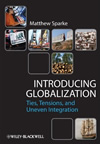Introducing Matthew Sparke
 Matthew Sparke is Professor of Geography and International Studies at the University of Washington in Seattle where he also serves as the Director of the Undergraduate Program in Global Health. He is the author of multiple articles on geopolitics and globalization, as well as two books: “In the Space of Theory” (2005) and “Introduction to Globalization” (2013).
Matthew Sparke is Professor of Geography and International Studies at the University of Washington in Seattle where he also serves as the Director of the Undergraduate Program in Global Health. He is the author of multiple articles on geopolitics and globalization, as well as two books: “In the Space of Theory” (2005) and “Introduction to Globalization” (2013).
Geopolitical Passport
Please note that Professor Sparke changed some of the 10 common Geopolitical Passport questions and left out a few.
 At what age did you discover geopolitics and what attracted you to it?
At what age did you discover geopolitics and what attracted you to it?
I first discovered geopolitics when my grandfather presented me with a tatty old book entitled “The Wonder Book of Empire”.
I was probably about 9 years old at the time, and I was attracted to the pull-out map at the back of the book that depicted the British Empire in a lurid bright red. Only much later, when I was an undergraduate at the University of Oxford, did I come to see that bright red as a graphic representation of all the blood spilled in the interests of securing imperial control over territory.
Of course, understanding the violence implicated in imperial map-making and other geopolitical representations of territory tends to make people recoil from geopolitics. It is not attractive in the slightest (unless you are one of those Brits who has found a way to sell snotty imperial bombast as academic expertise to Americans).
Anyway, at Oxford myself I was not attracted to geopolitical debates all that much. In fact I struggled to develop both the necessary knowledge of global affairs as well as any theory that might help me make sense of it.
As a fairly provincial student from a lower middle class background in Kent, I was neither well-tutored in working class internationalism nor well-travelled and worldly-wise like many wealthier students.

Feeling frustrated, I was always also in awe of these other more articulate voices on international affairs. They all seemed to enjoy such a sure sense of where they stood on global politics (although there were a few latter-day fans of Halford Mackinder in the School of Geography who I did realize shouldn’t have felt so sure-footed following the footsteps of Oxford’s original geopolitician).
By contrast, I had trouble seeing where I stood, even (or perhaps especially) as I became attracted to Marxist critiques of the simple ‘there-ness’ of geography.
Which geopolitical topics became your focus after this?
While I saw how Marxian theories applied to the production of regional and urban space, I initially found it harder to understand how dynamics such as the ‘spatial fix’ might play out at the international scale.
Sad to say, despite going to most of his sessions on reading Capital, I could not even understand David Harvey’s main argument in his important early essay on geopolitics (the first version I read was David Harvey, 1985. “The geopolitics of capitalism,” in Derek Gregory and John Urry, eds., “Social Relations and Spatial Structures”. London: Macmillan. 128-163).
Nevertheless, as a caring, accessible and non-pretentious mentor, David did give me the confidence to acknowledge such moments of academic incomprehension. More than this, he also urged me to think about applying to graduate schools in North America.
Having grown-up in Kent himself, maybe he saw my home counties naïveté for what it was. In any event, I remain indebted to him for this personal advice as well as for the inspiration of his academic work.
And its precisely thanks to following his advice, leaving Britain, and studying in Canada at UBC, that I finally got some focus on what he had been arguing in his work about geopolitics as it relates to the tensions between spatial fixity and expansion at the heart of global capitalism.
What do you consider your most important contributions to geopolitics?
Working with Derek Gregory and Gerry Pratt in Vancouver I was educated further about the lessons of both postcolonial and feminist theory (including theories of visual culture and the persistence of vision) for the critical study of geopolitics.
At the same time (1990-1991), the so-called Gulf War took place (quite literally so), and coming together with my broadened engagement with critical theories of international relations, it became the focus of my first publication on geopolitics: an essay addressing the masculinism of Operation Desert Storm and allied geopolitical imaginations (Matthew Sparke, 1995, “Writing on Patriarchal Missiles: The Chauvinism of the Gulf War and the Limits of Critique,” Environment and Planning A, 26 (7), pages 1061 – 1089).
I do not mean to suggest that this was an important contribution. Indeed, as another great mentor, Trevor Barnes, kindly warned me at the time, most of what we write just goes down the academic drain without a trace (an especially apt warning given where he made it).
Nevertheless, this old 1995 paper made a case for persistently re-examining the construction of geopolitical truth; a case which I have repeatedly revisited in the subsequent years, including in my books. The first of these featured a final chapter in which I also returned to empire, engaging the many insights of Hardt and Negri’s “Empire” while critiquing the way their geoeconomic wonder about ‘smooth space’ obscured the geopolitical interests and imaginations of American global hegemony.
My new book connects these themes to an attempt to make sense of what I call ‘big G’ Globalization discourse (the sort propounded by Thomas Friedman and other TINA touts). Here I contest the geoeconomic myths of flat-ness, new-ness and inevitability that are used to naturalize neoliberalization, and, in doing so, I stress again the need to examine the ties and tensions between geoeconomic assumption and geopolitical assertion amidst all the inequalities and asymmetries created by market-led globalization.
Your relationship with geopolitics
How do you now approach the challenge of defining geopolitics?
“Introducing Globalization” is principally aimed at undergraduate audiences. Putting myself in their shoes, I revisit some of my own undergraduate frustrations and, in chapter 8 on the spatial ramifications of globalization, I return thus to David Harvey’s definition of geopolitics.
Hopefully the way I interpret and combine his account with my own arguments about geoeconomics shows that I have now moved beyond my early incomprehension. And hopefully too my own account will in turn be useful to another generation of students seeking to make sense of the underlying forces shaping both geopolitical news and more formal forms of geostrategic discourse.
“The important point to remember in this respect,” I argue, “is that these geographical representations of international relations reflect the tensions of uneven development but in ways that tend to abstract particular territorial problems or ideals out of the processes of historical-geographical transformation that produce them. An ‘arc of instability’ or ‘disputed border’ might thereby be blamed for causing geopolitical unrest; while a ‘free trade region’ or ‘free zone’ may be idealized as bringing geoeconomic peace and prosperity” (Sparke, 2013: page 289).
Which geopolitical scientist do you admire the most?
Clearly my concern with capitalist uneven development also owes a large debt to Neil Smith’s work (although its absurd to call him a ‘geopolitical scientist’ given the lengths he went to in his Bowman book to historicize the 20th century transformations of late imperial geopolitical science).
His tragic recent death means that I, like so many others, will no longer benefit from being able to discuss geopolitics and the endgames of globalization with Neil. He taught me so much, but one point on which I think I started to disagree with him was on his tendency to ontologize things like scale and geopolitics.
Leaving the scale debates non-represented here, let me just say that I don’t think its useful to think of geopolitics or geoeconomics as spatial or socio-historical essences that can be understood in their own discrete ontological or epochal terms. By contrast it seems more useful (and ultimately more materialist to me) to make sense of them instead as affect-laden visions and powerful representational relays of uneven development.
“Analytically,” I suggest in “Introducing Globalization”, “this also means coming to terms with how geopolitics and geoeconomics are actually entangled with one another today in the form of a ‘double vision’: a double vision that maps the divergent economic imperatives towards territorial fixing and geographical expansion in a distortive way that repeatedly divides the world into distinct zones – zones of geopolitical conflict on the one side and spaces of geoeconomic peace on the other – rather than coming to terms with the global ties between the two. By tracing how territorial struggles reflect historical–geographical processes of uneven development, we can instead correct for the distortion and better understand the connections” (Sparke, 2013: 289).
Who are your other favourite geopolitical writers?
Beyond those who I’ve mentioned already here – including the extraordinary inspiration of Derek Gregory’s work on the colonial present of drone-war and global kill-chains – there are many other critical geographers who offer invaluable ideas for students attempting to put geostrategic discourses and practices into their appropriate political, economic and cultural contexts of emergence and articulation.
In this way I continue to value very much the work of John Agnew, David Campbell, Sanjay Chaturvedi, Brett Christophers, Simon Dalby, Klaus Dodds, Mona Domosh, Steve Graham, Gill Hart, Jennifer Hyndman, Cindi Katz, Heidi Nast, Joe Nevins, Sue Roberts, Paul Routledge, Ananya Roy, Anna Secor, Jo Sharp, James Sidaway, Gerard Toal, Michael Watts and Melissa Wright.
This might already look like an over-extended shout-out given the shorter entries on this site by commentators who hold more ‘command and control’ views on geopolitics.
Nevertheless, if I may widen the field still further here, there are lots of other younger scholars whose work usefully complicates traditional ‘geopolitics’ too: Mona Atia on the geopolitical implications of financialized civil society in the Middle East; Matt Coleman on neoliberal border regimes; Jamie Essex on global food programs; Matt Farish on the Cold War popular culture in the US; Jennifer Fluri on NGO enclaves; Phillipe Le Billon on resource wars; Sara Koopman on alter-geopolitics; Jake Kosek on the bio-geopolitics of nature; Naomi Millner on the demo-geopolitics of citizenship; Ron Smith on the occupation of the Palestinian territories; Stephen Young on the global red lines of microfinance; and Marion Werner on the borders of coloniality.
There are also some great authors outside of geography whose work I have found invaluable as I have more sought in the last two years to tie my interests in geopolitics and globalization to new work on global health. Mike Davis, Naomi Klein, Arundhati Roy and Vandana Shiva all count in my book as critical theorists of the unhealthy geopolitical shocks and shock doctrines allied with global neoliberalization.
At the same time, I have found salutary lessons in the writing of the physician and anthropologist Paul Farmer on the need to tie the global struggle for health with a clear-eyed examination of the structural violence inflicted by inequality, debt and debt-based market discipline. Running through the analyses of all these non-geographers is also a remarkable geo-graphical sensitivity to the damaging power of geopolitical discourse in explaining away, excusing or obscuring forms of disease and suffering caused by dispossession.
‘Geographies of blame,’ to use Farmer’s brilliant phrase, tend thus to redeploy old geopolitical tropes to blame the victims, rather than to explore the geographical ties of uneven global development that account for so much dispossession and disease in the first place.
When it comes to exploring such ties there is more new work to mention than can be adequately summarized here (although I have tried elsewhere in a recent essay on ‘Health’ that is available on my web site). Save it to say that health geographers such as Mark Hunter have been showing that careful ethnographies of dispossession provide a much needed anti-geopolitical antidote to ‘dark continent’ discourses of blame.
His brilliant book “Love in the Time of AIDS” is definitely one of my recent favorites, and for related reasons one of my favorite geopolitical websites is also about global health (and also does not presume to be about geopolitics).
What is your favourite geopolitical website?
It is Humanosphere, and while focused on global health and aid news, it repeatedly brings attention to the ways in which informal and largely un-problematized geopolitical maps and representations shape the way health aid is imagined, implemented and experienced globally: Humanosphere
Meanwhile, scholars such as Bruce Braun, Tim Brown, Susan Craddock, Johanna Crane, Alan Ingram, Vinh Kim Ngyuen, Simon Reid-Henry, and Claire Wendland are already examining the sorts of exceptions and hierarchies that result from such (re)territorializing representations.
The geopolitical future
In what direction(s) will geopolitical science be heading the coming decades?
For me at least, these enquiries into the inequalities and interconnections of health citizenship and health security globally represent an important future direction for critical geopolitical work.
As such they are also the inspiration of my next project, a joint-authored book with Katharyne Mitchell tentatively entitled “The New Washington Consensus: Global Health, Education and the Rise of Philanthrocapitalism”.
